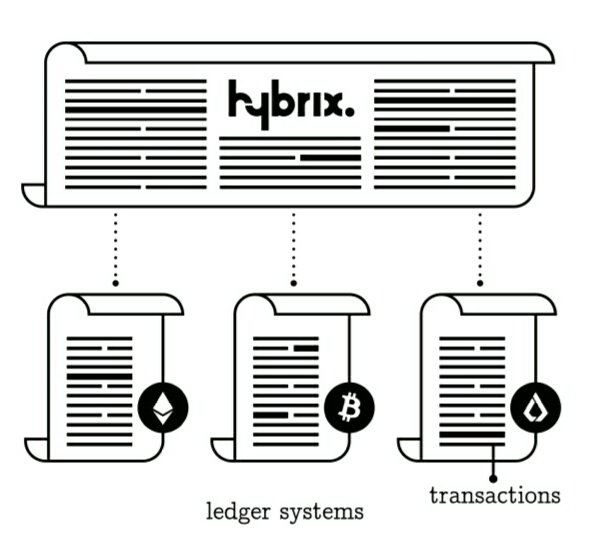COMPARISONS THAT MAKES HYBRIX AN EXCEPTIONAL PLATFORM

It's a well-known fact that there are many blockchain systems in the world today while some uses smart contracts others don't, while some have different DApps others don't, and while some use Proof-of-Stake system others use Proof-of-Work system, in addition, there are even some that are hybrid in nature, that is, uses both (PoW and PoS) consensus algorithms. Nevertheless, the features of these blockchain systems, isn't why we are here today, rather it is just to create a medium to throw more light on the growth of the blockchain world over the years.
On the other hand, there is a blockchain platform which is already developed and making waves currently, what makes this blockchain platform to stand out is the fact it works or rather leverages on a lot of blockchain systems to create a truly decentralized platform. This is platform is known as HYBRIX PLATFORM.
The important question is, what is Hybrix all about? This will succeed in bringing a brief summary first on what Hybrix is all about.
Hybrix is a platform built with the aim of bringing about a protocol (or a colored coin) whose sole purpose is to make cross-ledger or cross-blockchain operations possible thus leading to a platform that is technically borderless and not bounded to a single ledger system.
In the same way, the Hybrix protocol is very beneficial to all users because it is easily accessible, open by design, not controlled or limited to a centralized party, enables users to transfer value or assets between ledger systems and provides users with the possibility to issue tokens.
This brief summary is, in fact, the basis of the Hybrix platform.
Now with this brief summary, it is important knowing why Hybrix is different, that is, comparing it to other existing blockchains platforms.

COMPARING HYBRIX TO OTHER EXISTING BLOCKCHAIN PLATFORMS
Point 1
It has been proven that in certain blockchain systems, there are third-party services which currently assist users of the said platform to exchange one form of digital asset for another; the existence of the third-party isn't the issues, but the main issue is, how trusted is the third-party such that it is banked on to mediate these underlying transactions?. Another occurring issue is that decentralized exchanges have been found to mostly operate on a single chain or strictly between compatible ledgers, that is to say, there are limitations in what's expected.
On the other hand, by way of comparison, Hybrix stands out, such that the team brought about a solution to these problems isolated digital currency systems are facing; this solution comes in the form of using a meta-level transfer protocol with an extendable design such that any kind of ledger-based ecosystem, digital cash system for cross-blockchain and inter-systemic transactions are made easily accessible for all parties.
Point 2
There are some platforms which might leverage another platform to achieve their goals, Hybrix did more than this.
Like earlier stated there are many consensus algorithms and these platforms are onboard Hybrix, now in the case of Hybrix instead of inventing another network infrastructure, it ends up using the data layer of the underlying infrastructure in addition with
its consensus mechanism. This will then allow Hybrix to make use of the combined powers of these platforms to create a truly cross-ledger asset, while all the benefits of the underlying ecosystems will be duly noted. The main advantage is, these ecosystems will benefit from supporting the Hybrix protocol.
Someone might ask, what actually is the benefits? In the Hybrix platform, once a transaction is carried out, it yields a profit to the respective ecosystem by paying
transaction fees to its network supporting miners and stakers.
Point 3
A study has shown that most top institutions like R3, IBM, Ripple etc are creating "pseudo-trustless" and "permissioned" solutions for the exchange of assets which is also presented as secure and trustless to the public. However, the solutions from these organizations aim to create a profitable endeavour which is biased; this will make users the customer or product of new financial technology gatekeepers. In addition, the solutions offered lacked transparency thus can be seen to be hugely operated on a centralized way.
On the other hand, what Hybrix offers is entirely different. Hybrix brought a protocol which will make value transfer between distributed ledger systems to be transparent neither will it be controlled in a centralized way. Also, this protocol makes it possible for users to move units of account across distributed ledger systems in a truly decentralized way, thus leading to the ability to exchange assets on-chain. Furthermore, with the possibility of transferring value, Hybrix offers an alternative platform to centralized exchanges.
Point 4
Looking at Bitcoin, Ethereum and other cryptocurrencies, there are advanced features which exist such as scripting and smart contracts. These advanced features enable many users to create more financial solutions, however, the consensus algorithms of these solutions etc are only available on the ledger on which they are implemented. In addition, there have been cases where atomic transactions are used to connect distributed ledgers, but however, these solutions need specific compatibilities which unfortunately cannot be found in all ledger systems.
On the other hand, Hybrix once again came to the rescue, in this case, it brings about a common protocol that works on any ledger.
The Hybrix protocol was able to work on any ledger because it is a second-level token protocol that is capable of transacting units of account on a single ledger or over multiple blockchain systems.
Also, the transactions which took place are stored in a data block of the distributed ledger system in question, this data block is found inside the attachment section of a zero-value transaction.
Furthermore, with this feat, Hybrix gives users the ability to move units of accounts to any ledger system they want.
Point 5
There is no doubt that in the crypto space and/or the blockchain space, there are many systems that are found wanting when it comes to the implementation and development of cutting edge technology; because of this, supporting their advanced development is in no way guaranteed which might even result to bad experiences for all parties.
The Hybrix protocol, on the other hand, strives not to use the advanced features of any specific ledger system, thereby avoiding the chances of becoming highly dependent on any single distributed ledger system. Also, for the sake of optimum performance, Hybrix laid down requirements which must be followed and met by all ledgers coming to its platform. This includes,
a. Immutability of past transactions of which all transactions must be publicly available thus making the verification of the transaction chain possible.
b. It must be possible to verify the signing and authentication of transactions.
c. All transactions must have a unique transaction id, an attachment field for the purpose of storing data source and a target address or addresses as the case may be.
Point 6
Another comparison is in the aspect of blockchain validators. Validators are very important in any blockchain system because they help to validate transactions on the chain. However, there have been cases where validators are found wanting, that is, not properly doing their job.
Therefore to solve these problems or neglect which exists or will likely happen, many platforms have offered different solutions.
The first is Omni, which chose to validate from a centralized entity thus reducing the complexity of the solution, but instead, it is not a good approach in a system where decentralization is meant to be possible. Also, with the increasing workload for
validating the transactions puts all the work on the centralized validation entity thus reducing the security and integrity of the transaction ledger.
The second is Ripple, which chose to select
the amount of validators that have a good stake in the ecosystem all in a bid to make sure transactions are completed properly. However, when a validator is found wanting, the penalty is a possible reduction of stakes.
Then on getting on the Hybrix platform, the team choose a way which will always uphold the decentralized nature of the platform. That is to say, Hybrix cannot reduce the stake of any party in the network from an authoritative entity, however, Hybrix ensures that in the case of not doing the appropriate job there will be the invalidation of fees which will relate to the type of errors of that validator in question.

CONCLUSION
In conclusion, Hybrix is a platform with a meta-protocol and blockchain integration solution with all necessary features to run at optimum capacity. Also, the said solution which Hybrix offers comes in the form of a decentralized asset which is used for transacting value across different digital currency systems. In addition, this solution also allows for ledger and blockchain platforms to be used as a value transfer medium without needing any third-parties.
However, there is a unique feature that exists within Hybrix and that is, it doesn't rely on centralized exchanges or decentralized atomic transaction supports, thus can be seen to be open and transparent.
Furthermore, it is very important to know that Hybrix platform is already running at maximum capacity with the node, wallets, explorer and so on being fully operational; however owing to the need to be efficient, more work is still being done on the platform.
Lastly, to be part of an environment of growth, Hybrix is trading on Biki exchange
PLATFORM LINKS
Twitter: https://twitter.com/hybrix_io
GitHub: https://github.com/hybrix-io
Telegram: https://t.me/hybrix_io
Discord: https://discord.gg/WbDfAWb
Website: https://hybrix.io/
Whitepaper: https://hybrix.io/docs/papers
ANN: https://bitcointalk.org/index.php?topic=5230324.0
API Documentation: https://api.hybrix.io/help/api
Author's Bitcointalk Username: Flezy
Author's Bitcointalk Profile Link: https://bitcointalk.org/index.php?action=profile;u=2187485